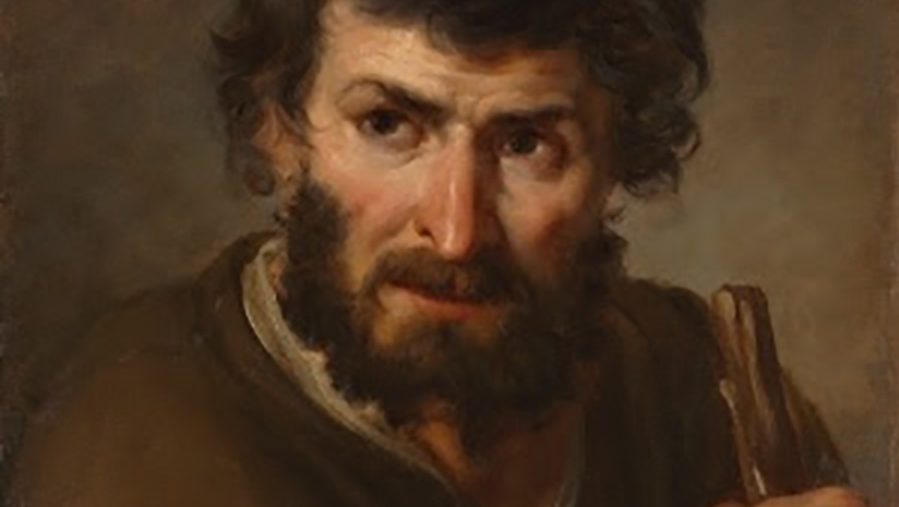Liturgy: “We Need to be Saved”
In our culture, outside the church, and even in many places within it, we skip from Thanksgiving to Christmas without thinking much about Advent, or if Advent is observed, it is presented entirely as a happy time.

What is the King’s Liturgy? King’s Liturgy defines our experience together as a Christian community. It outlines the rhythms we celebrate with the Church at large: Scripture readings, Sabbath habits, and celebration of Holy Days and historical events.
This Week’s Lectionary Readings
Isaiah 64:1-9
1 Corinthians 1:3-9
Mark 13:24-37
Psalm 80:1-7, 16-18
This week’s liturgy is contributed by Emily Schatz, King’s College historian:
Last year when we were visiting my family in Ohio for Thanksgiving, we took a trip to the Cleveland Museum of Art. In one of their galleries I came across a painting of a shepherd by an unknown French artist from the 1700s, and I could barely tear myself away. He came to mind when I read the verses for this week, and I think he can help illustrate what I want to point out about these verses as we enter Advent.
The man in this painting does not look particularly good or particularly happy. His expression is vigilant and sharp as if he is familiar with unscrupulous dealings, and his posture is defensive. This is not how we ordinarily think of shepherds, but according to one of my pastors, shepherds had just such a dishonest reputation in Israel at the time of Christ. They were social outcasts, and they were outcasts for a reason.
I am not saying this painting is meant to depict one of the shepherds in the Christmas story. There is no indication of that in the information from the museum. And yet it reminds me of it, because as the light falls on this man’s face, there is also doubt and longing—as if something embodying all he has ever hoped for or desired is appearing before his eyes, both challenging and activating his habitual fearfulness. This portrait could have been painted in the first moments after Gabriel said “Fear not,” before the first spasm of terror relaxed its hold.
The verses for this week express exactly this combination of desire and dread: “Oh, that You would rend the heavens! That you would come down!” (Isaiah). “You who dwell between the cherubim, shine forth!” (Psalm 80). The passage in 1 Corinthians speaks of “eagerly waiting for the revelation of our Lord Jesus Christ.” But in Mark, Jesus speaks of that revelation as a fearful spectacle in which the sun will be darkened and the moon will not give its light, warning his hearers not to be caught asleep when the master returns. Psalm 80 asks God directly about his wrath: “How long will you be angry against the prayers of your people?”—and Isaiah says, “You are indeed angry, for we have sinned—in these ways we continue, and we need to be saved.”
We need to be saved.
In our culture, outside the church, and even in many places within it, we skip from Thanksgiving to Christmas without thinking much about Advent, or if Advent is observed, it is presented entirely as a happy time—chocolates hiding behind flaps in a calendar to heighten your anticipation of the greater treasures yet to be unwrapped on Christmas Day.
I do not want to say this is not right. I love the excitement of Christmas dearly—the tree and how it smells, baking with inexcusable amounts of butter, presents and secrets and buying things on a different credit card so my husband doesn’t figure out what I got him, and perhaps most of all the lights. Advent should be joyful. Gabriel’s words were, after all, good news of great joy that shall be for all people. Jesus has already come and already saved us.
But Advent is also historically a penitential season. Advent hymns are noticeably somber, minor, and full of awe: “Let All Mortal Flesh Keep Silence” is the prime example but the more familiar “O Come O Come Emmanuel” has it too. This is because Advent has two dimensions: we are not just reenacting the waiting of Israel for Jesus’s first coming—we too are waiting for His second one. At this second coming the thoughts of every heart will be revealed, and we are so much like the painted shepherd—not particularly happy, not particularly good. As we anticipate the celebration of His arrival, it is appropriate to remember who we are, so that we can more intensely desire what we will become.
As for the shepherds’ dread, and the Second Coming and Last Judgment, there is more to that verse in 1 Corinthians about eagerly waiting for the revelation of Christ: it identifies Him as the One “who will confirm you to the end, that you may be blameless in the day of our Lord Jesus Christ.”
He Himself is enough, both for our hearts and for our sins. This is good news of great joy indeed.
May your Advent, finals, and Christmas journeys be blessed.




